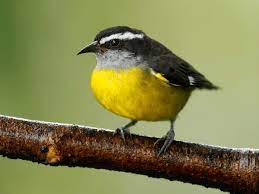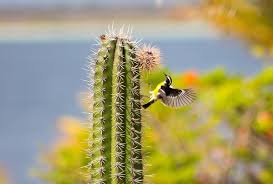Bananaquit: Virgin Islands’ Ambassador
The Bananaquit: Official Bird of the Virgin Islands
The Bananaquit (Coereba flaveola), with its vibrant plumage and distinctive features, proudly holds the title of the official bird of the Virgin Islands. This charming little bird, often referred to as the “Sugar Bird” or “Yellow Bird,” is not only a symbol of the region’s natural beauty but also a fascinating creature with a rich ecological significance.
Native to the Caribbean, including the Virgin Islands, the Bananaquit belongs to the family Coerebidae and is recognized for its unique appearance and behavior. Measuring about 10 centimeters in length, this small bird exhibits a compact build, with a short, curved bill and a prominent black stripe running through its eye. Its plumage is a striking blend of yellow and black, with subtle variations across subspecies and individuals.

The Bananaquit is the official bird on the Virgin Islands
One of the Bananaquit’s most distinctive features is its keen love for nectar. It is equipped with a specialized, slender bill that allows it to extract nectar from various flowering plants. This adaptation not only influences its diet but also plays a crucial role in the pollination of numerous plant species, making the Bananaquit a key player in the region’s ecological balance.
In the Virgin Islands, the Bananaquit is a familiar sight in gardens, parks, and natural habitats. Its cheerful presence and melodious song contribute to the islands’ vibrant and diverse avian tapestry. Observing a Bananaquit in action is an enchanting experience, as it flits from flower to flower, sipping nectar and spreading pollen, showcasing the interconnectedness of the region’s flora and fauna.
Apart from its love for nectar, the Bananaquit possesses a diverse diet that includes fruits, insects, and even small spiders. This adaptability has contributed to its widespread distribution and success in different ecosystems, from coastal areas to mountainous regions. Its foraging behavior is both agile and acrobatic, as it skillfully maneuvers through branches and foliage to find food.
The Bananaquit’s breeding habits are equally fascinating. During the mating season, males engage in captivating displays to attract females. The courtship ritual involves elaborate flights, vocalizations, and the presentation of nesting materials. Once a pair forms a bond, the female constructs a cup-shaped nest using materials such as twigs, grass, and fibers, often suspended from a branch. This resourcefulness in nest-building highlights the Bananaquit’s adaptability and intelligence.
Beyond its ecological role and behavioral intricacies, the Bananaquit holds cultural significance in the Virgin Islands. Its presence in local folklore and art reflects the bird’s symbolic importance to the community. The Bananaquit’s bright and sunny disposition mirrors the spirit of the islands, contributing to its designation as the official bird, a symbol of the region’s natural wealth and biodiversity.
Conservation efforts play a crucial role in ensuring the Bananaquit’s continued presence in the Virgin Islands. Habitat loss, climate change, and invasive species pose significant threats to the delicate balance of the region’s ecosystems. Conservation initiatives aimed at preserving natural habitats, educating the public about the importance of biodiversity, and monitoring the health of bird populations are essential to safeguarding the Bananaquit and other avian species.

A Bananaquit in feeding mode
In conclusion, the Bananaquit stands as a feathered ambassador of the Virgin Islands, representing not only the islands’ natural beauty but also the delicate web of life that sustains its ecosystems. From its vibrant plumage to its vital role in pollination, this small bird captures the essence of the Caribbean’s rich biodiversity. As the official bird of the Virgin Islands, the Bananaquit serves as a reminder of the need to appreciate and protect the unique natural heritage of this tropical paradise for generations to come. Happy anniversary, Bananaquit!
